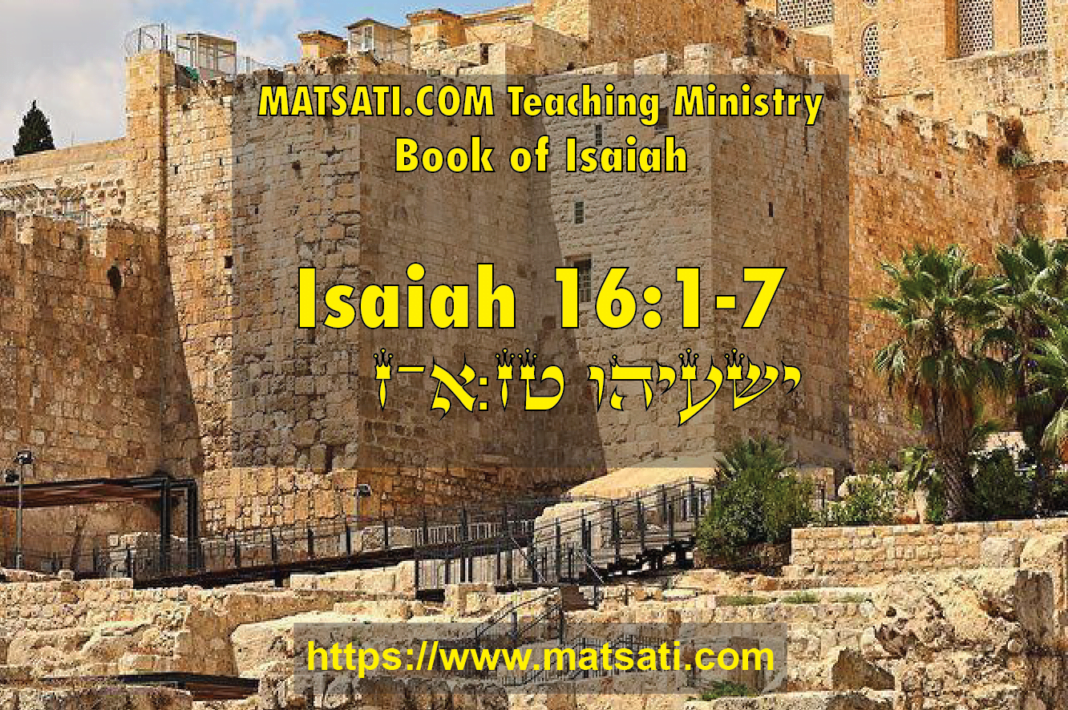Isaiah 16:1-7
In Isaiah 15 the text was a lament to Moab which described her destruction. In Isaiah 16:1-5 there appears to be a plea on behalf of Moab to Judah because of her troubles. Isaiah 16:6-12 then appears to be a response to Isaiah 16:1-5. We note the contrast of Judah and Jerusalem between their fallen state and their pride. The same is being said here in Moab, that her pride was tremendous and consequently the downfall must also be tremendous. Note the point of Isaiah 15 and 16, that when one takes their stand against the God in heaven, the God of Israel, there is nothing but utter hopelessness because who can fight against God our Creator? These words of Isaiah speak to Judah and Jerusalem not to place their trust in Moab for help because she will be in the same situation as them due to her sins. Looking at Isaiah 16:1-5 there are connections to the Ancient Literature, from the Pseudepigrapha and the DSS Sectarian Materials 1QHa scroll which provide us with additional insights into Isaiah 16.
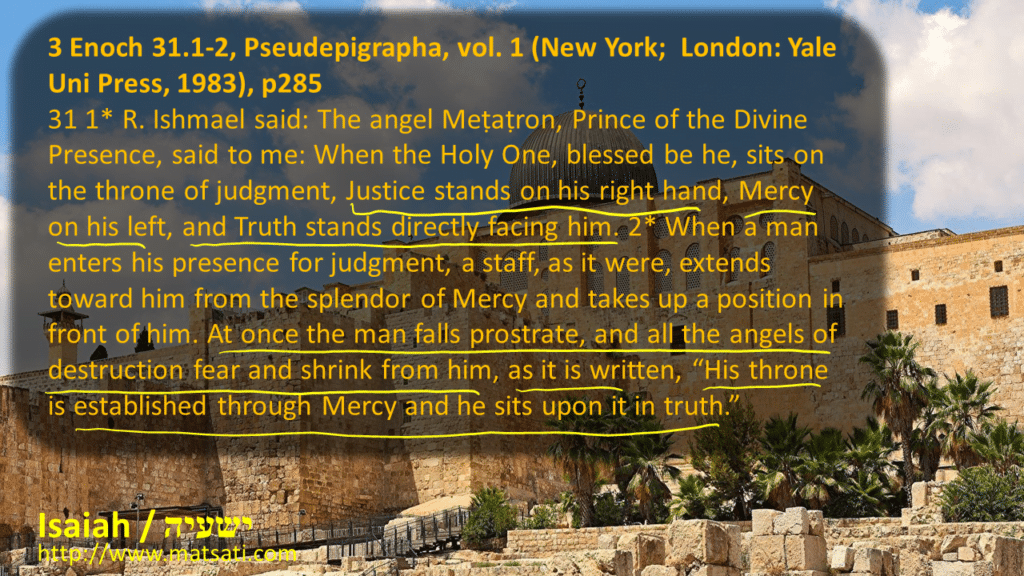
3 Enoch 31.1-2, Pseudepigrapha, vol. 1 (New York; London: Yale Uni Press, 1983), p285
31 1* R. Ishmael said: The angel Meṭaṭron, Prince of the Divine Presence, said to me:
When the Holy One, blessed be he, sits on the throne of judgment, Justice stands on his right hand, Mercy on his left, and Truth stands directly facing him. 2* When a man enters his presence for judgment, a staff, as it were, extends toward him from the splendor of Mercy and takes up a position in front of him. At once the man falls prostrate, and all the angels of destruction fear and shrink from him, as it is written, “His throne is established through Mercy and he sits upon it in truth.”
The book 3 Enoch describes Metatron, the greatest of angels in Jewish myths and legends. Metatron is not a figure of the Hebrew Bible, but his name appears briefly in several passages of the Talmud. His legends are predominantly found in mystical Kabbalistic texts. We note the Kabbalistic description of “The angel Meṭaṭron, Prince of the Divine Presence” is commonly described as a celestial scribe recording the sins and merits of men, as a guardian of heavenly secrets, as God’s mediator with men. This Metatron has messianic attributes and also being the one who exacts God’s judgment. The reference here in the Pseudepigrapha is to the mercies of God that are coupled with truth and justice when a man enters the presence for judgment. Note what happens when a man falls prostrate before the Lord God Almighty? The text states that the angels of destruction fear. The reason being, “His throne is established through Mercy, and he sits upon it in truth.” This speaks to the power of repentance. These laments and responses given as a prophetic word to Moab speak to the prophet calling out to the people to repent, to turn from their sins, and demonstrates how the Ruach HaKodesh (Holy Spirit) speaks a prophetic word for the purpose of drawing men to repentance. Even men from the pagan nations are called to repentance since the way of salvation is open to all who are willing to seek the God of Israel and humble themselves! The DSS sectarian Materials from the 1QHa scroll state the following:
DSS Sectarian Materials 1QHa
| 1QHa Col. xiii:21 21 measureless. Wonderful heroes are your attendants, and with the humble ones in the mud before [your] feet […] with those apprehensive | 1QHa Col. xiii:21 21 לאין מדה וגבורי פלא משר{י}תיכה ועם ענוים בטאטאיי רגלי[כה …] עם נמהרי | 1QHa Col. xiii:21 21 lions. |
| 1QHa Col. xiii:22 22 of justice, to raise from desolation the community of all {…} the poor of kindness. But I have been the target of sl[ander for my rivals,] cause for quarrel | 1QHa Col. xiii:22 22 צדק להעלות משאון יחד כול {…} אביוני חסד ואני הייתי על ע[ון מ]דני לריב | 1QHa Col. xiii:22 Hymn 18. A true Teacher hymn of thanksgiving or blessing to God, who does not forsake those who turn to him despite the torments of the wicked. 22{I give thanks to You} Blessed are You, O Lord, for You have not abandoned the orphan, and You have not despised the poor. For Your strength [is unboun]ded and Your glory |
| 1QHa Col. xiii:23 23 and argument to my neighbors, for jealousy and anger to those who have joined my covenant, for challenge and grumbling to all my followers. Ev[en those who e]at my bread | 1QHa Col. xiii:23 23 ומדנים לרעי קנאה ואף לבאי בריתי ורגן ותלונה לכול נועדי ג[ם או]כלי לחמי | 1QHa Col. xiii:23 23without measure. Your ministers are wondrous warriors. A humbled people are in the sweepings at [Your] feet [and You have done a miracle as well] with those heedless of |
| 1QHa Col. xiii:24 24 have raised their heel against me; they have mocked me with an unjust tongue all those who had joined my council; the men of my [congrega]tion are stubborn, | 1QHa Col. xiii:24 24 עלי הגדילו עקב ויליזו עלי בשפת עול כול נצמדי סודי ואנשי [עד]תי סוררים | 1QHa Col. xiii:24 24 righteousness to bring them up from out of the desolation together with all of those {heedless} lacking mercy. But I myself have become […] strife |
| 1QHa Col. xiii:25 25 and mutter round about. And about the mystery which you have concealed in me they go slandering to the sons of destruction. In order to show my [pa]th and because of | 1QHa Col. xiii:25 25 ומלינים סביב וברז חבתה בי ילכו רכיל לבני הוות ובעבור הגד[ דר]כי ולמען | 1QHa Col. xiii:25 25and contentions for my fellows, jealousy and anger to those who have entered into my covenant, a grumbling and a complaining to all who are my comrades. Ev[en those who sha]re my bread |
| 1QHa Col. xiii:26 26 their guilt you have concealed the source of understanding and the foundation of truth. They plot evil in their heart, m[en of Be]lial have opened | 1QHa Col. xiii:26 26 אשמתם סתרת מעין בינה וסוד אמת והמה הוות לבם יחשובו וא[נשי ב]ליעל פתחו | 1QHa Col. xiii:26 26 have lifted up their heel against me, and all those who have committed themselves to my counsel speak perversely against me with unjust lips. The men of my [coun]cil rebel |
| 1QHa Col. xiii:27 27 a lying tongue, like vipers’ venom that spreads to the extremities, like crawlers in the dust they shoot to gra[b,] serpents’ [poison], | 1QHa Col. xiii:27 27 לשון שקר כחמת תנינים פורחת לקצים וכזוחלי עפר יורו לחתו[ף מבלגות] פתנים | 1QHa Col. xiii:27 27and grumble round about. And concerning the mystery which You hid in me, they go about as slanderers to the children of destruction. Because [You] have exal[ted Yourself] in me, |
We are looking here at the DSS Sectarian Materials from the 1QHa scroll, Column 13 and lines 21-27. In this section we read about the heroes, described as lions, and how justice will rise from desolation. The text describes neighbors who are jealous and angry to those who have entered into a covenant with God. There are some who pretend to be humble, saying they join the covenant of God but yet raise their heel against God’s council. These are those who slander God’s people, and God Himself and are those who do not know God, called the “sons of destruction.” These people grumble and complain, and are said to be the men of Belial, the children of Satan, perverse and with unjust lips. They have lying tongues and take hold of serpents; this is the description of those who go about as slanderers. This speaks to the issue of Lashon Hara in the congregation. We note that Paul addressed this issue according to 1 Corinthians 6:9 Do you not know that the wicked will not inherit the kingdom of God? Do not be deceived: Neither the sexually immoral, nor idolaters, nor adulterers, nor men who submit to or perform homosexual acts, 6:10 nor thieves, nor the greedy, nor drunkards, nor verbal abusers, nor swindlers, will inherit the kingdom of God. 6:11 And that is what some of you were. But you were washed, you were sanctified, you were justified, in the name of the Lord Jesus Christ and by the Spirit of our God. (BSB) Paul writes to the body of believers concerning these issues that remain within the body of believers. Paul makes it clear that we are not to fool ourselves that these are very serious connecting such people to the kingdom of Belial (Satan).
Note the differences between the prophets of the nations as compared to the prophets of Israel. Isaiah says “My heart laments for Moab like a harp” (Isaiah 16:11) illustrating how the prophets of Israel care. The fact that the prophet weeps does not change the fact that Moab persists in worshiping their false gods. We see in the opening verse the lamb sent to the ruler, there may be a messianic perspective here that relates to the salvation of a nation. The Moabite people however do not have understanding of the promises of the King Messiah because they do not have God’s word and are not acquainted with the Holy God of Israel. Isaiah begins saying the following according to Isaiah 16:1.
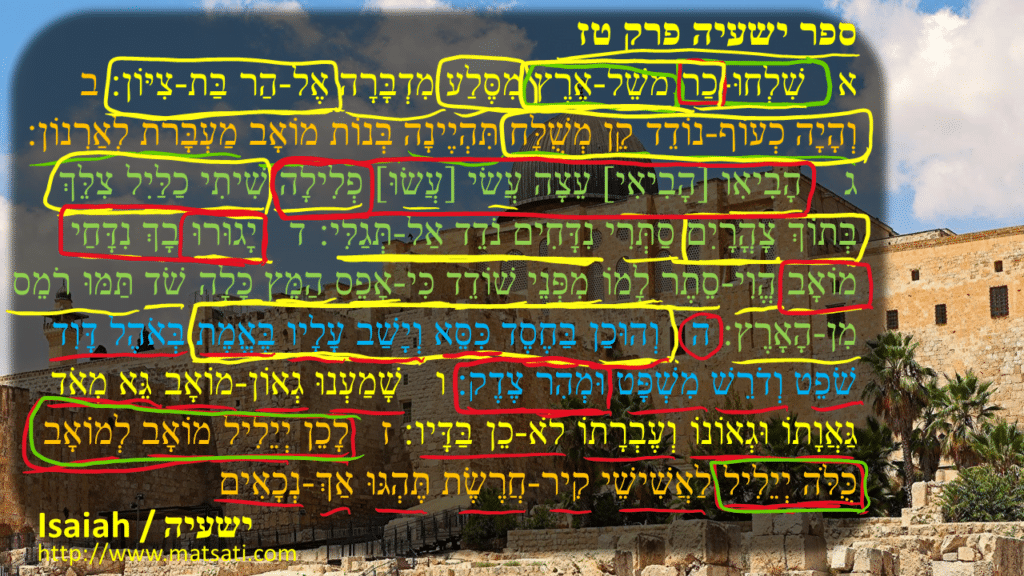
ספר ישעיה פרק טז
א שִׁלְחוּ-כַר משֵׁל-אֶרֶץ מִסֶּלַע מִדְבָּרָה אֶל-הַר בַּת-צִיּוֹן:
Isaiah 16:1 states, “Send ye the lamb to the ruler of the land from Sela to the wilderness, unto the mount of the daughter of Zion. (שִׁלְחוּ-כַר משֵׁל-אֶרֶץ מִסֶּלַע מִדְבָּרָה אֶל-הַר בַּת-צִיּוֹן)” Reading Isaiah 16:1, the words שִׁלְחוּ-כַר means “send a ram” according to HALOT. (כַּר: II כרר, Bauer-L. Heb. 453w; to skip, Eilers WdO 3:132; Ug. kr, Akk. ki/erru lamb, Lib.-Berber → ZA 50:134: כָּרִים, SamP. M120 kirrem: —1. (young) ram (for slaughter) Dt 32:14 1S 15:9 2K 3:4 Is 16:1 (rd. כָּרִים לְמֹשֵׁל) 34:6 Jr 51:40 Ezk 27:21 39:18 Am 6:4, cj. (כְּכָרִים) Is 14:30; —2. battering ram (Lat. aries, Arb. kabš, Meissner Bab. Ass. 1:109f.; Waschow 57ff.) Ezk 4:2 21:27; → n.loc. בֵּית כָּֽר (בַּיִת B 22).) This שִׁלְחוּ-כַר sending of the ram is suggestive of making a peace offering to the king or as the text states משֵׁל-אֶרֶץ “ruler of the land.” Isaiah says מִסֶּלַע מִדְבָּרָה אֶל-הַר בַּת-צִיּוֹן “from the rocks of the wilderness to the mountain of the daughter of Zion.” This map shows the general region of Moab in Isaiah 16:1.
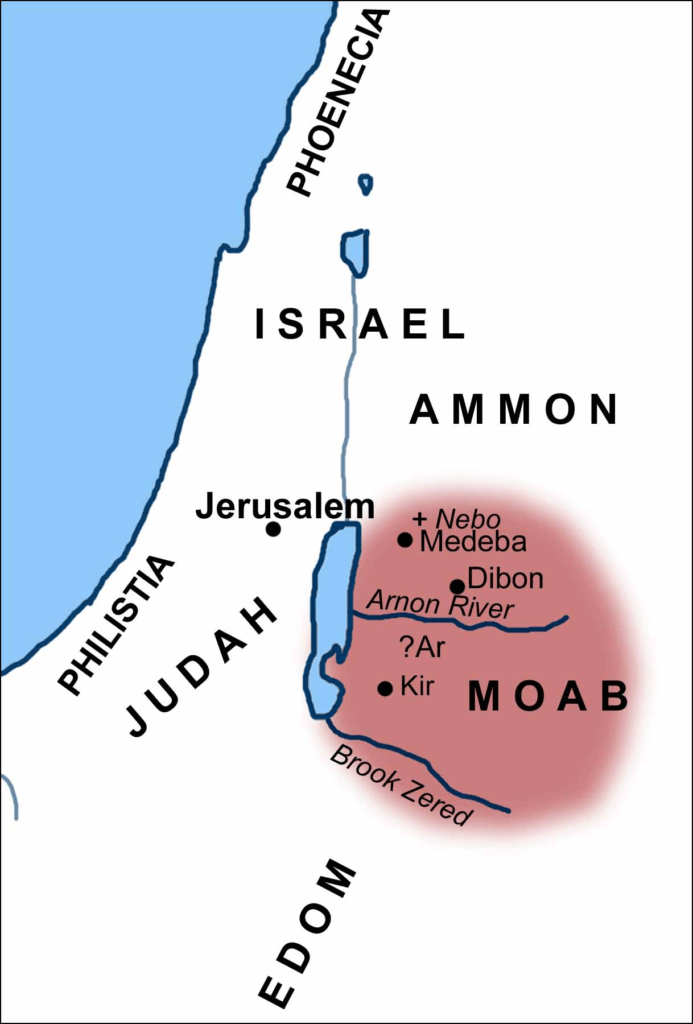
The idea of sending the ram to the rulers מִסֶּלַע מִדְבָּרָה אֶל-הַר בַּת-צִיּוֹן describes a wide region and may be associated with the fugitives that are described according to Isaiah 15. The picture that we are being given here in Isaiah 16:1 is that of the Moabites fleeing to Edom and even possibly making a plea to Jerusalem for help.
ספר ישעיה פרק טז
ב וְהָיָה כְעוֹף-נוֹדֵד קֵן מְשֻׁלָּח תִּהְיֶינָה בְּנוֹת מוֹאָב מַעְבָּרֹת לְאַרְנוֹן:
Isaiah 16:2 states, “For it shall be, that, as a wandering bird cast out of the nest, so the daughters of Moab shall be at the fords of Arnon. (וְהָיָה כְעוֹף-נוֹדֵד קֵן מְשֻׁלָּח תִּהְיֶינָה בְּנוֹת מוֹאָב מַעְבָּרֹת לְאַרְנוֹן)” There are a number of things this verse reminds us of from the Torah. The first is related to וְהָיָה כְעוֹף-נוֹדֵד קֵן מְשֻׁלָּח reminds us of Devarim / Deuteronomy 22:1-6 and specifically 22:6.
ספר דברים פרק כב
א לֹא-תִרְאֶה אֶת-שׁוֹר אָחִיךָ אוֹ אֶת-שֵֹיוֹ נִדָּחִים וְהִתְעַלַּמְתָּ מֵהֶם הָשֵׁב תְּשִׁיבֵם לְאָחִיךָ: ב וְאִם-לֹא קָרוֹב אָחִיךָ אֵלֶיךָ וְלֹא יְדַעְתּוֹ וַאֲסַפְתּוֹ אֶל-תּוֹךְ בֵּיתֶךָ וְהָיָה עִמְּךָ עַד דְּרֹשׁ אָחִיךָ אֹתוֹ וַהֲשֵׁבֹתוֹ לוֹ: ג וְכֵן תַּעֲשֶֹה לַחֲמֹרוֹ וְכֵן תַּעֲשֶֹה לְשִֹמְלָתוֹ וְכֵן תַּעֲשֶֹה לְכָל-אֲבֵדַת אָחִיךָ אֲשֶׁר-תֹּאבַד מִמֶּנּוּ וּמְצָאתָהּ לֹא תוּכַל לְהִתְעַלֵּם: ס ד לֹא-תִרְאֶה אֶת-חֲמוֹר אָחִיךָ אוֹ שׁוֹרוֹ נֹפְלִים בַּדֶּרֶךְ וְהִתְעַלַּמְתָּ מֵהֶם הָקֵם תָּקִים עִמּוֹ: ס ה לֹא-יִהְיֶה כְלִי-גֶבֶר עַל-אִשָּׁה וְלֹא-יִלְבַּשׁ גֶּבֶר שִֹמְלַת אִשָּׁה כִּי תוֹעֲבַת יְהוָֹה אֱלֹהֶיךָ כָּל-עֹשֵֹה אֵלֶּה: פ ו כִּי יִקָּרֵא קַן-צִפּוֹר | לְפָנֶיךָ בַּדֶּרֶךְ בְּכָל-עֵץ | אוֹ עַל-הָאָרֶץ אֶפְרֹחִים אוֹ בֵיצִים וְהָאֵם רֹבֶצֶת עַל-הָאֶפְרֹחִים אוֹ עַל-הַבֵּיצִים לֹא-תִקַּח הָאֵם עַל-הַבָּנִים:
Devarim / Deuteronomy 22:1-6
22:1 Thou shalt not see thy brother’s ox or his sheep go astray, and hide thyself from them: thou shalt in any case bring them again unto thy brother. 22:2 And if thy brother be not nigh unto thee, or if thou know him not, then thou shalt bring it unto thine own house, and it shall be with thee until thy brother seek after it, and thou shalt restore it to him again. 22:3 In like manner shalt thou do with his ass; and so shalt thou do with his raiment; and with all lost thing of thy brother’s, which he hath lost, and thou hast found, shalt thou do likewise: thou mayest not hide thyself. 22:4 Thou shalt not see thy brother’s ass or his ox fall down by the way, and hide thyself from them: thou shalt surely help him to lift them up again. 22:5 The woman shall not wear that which pertaineth unto a man, neither shall a man put on a woman’s garment: for all that do so are abomination unto the LORD thy God. 22:6 If a bird’s nest chance to be before thee in the way in any tree, or on the ground, whether they be young ones, or eggs, and the dam sitting upon the young, or upon the eggs, thou shalt not take the dam with the young: (KJV)
In this passage we are told that when you find a mother bird with its young, its eggs, you shall let the mother go. This reminds me of my childhood when cutting the grass using lawn mower, there were birds called killdeer that laid their eggs on the ground. The Killdeer get their name from their bird call that sounds like “kill-deer” and they are great actors, pretending to have a broken-wing to escape predators. It was interesting that while cutting the grass with the riding lawn mower, the mother bird would remain on the nest protecting the eggs and I would mow around the nest each week until the eggs hatched. This verse from the Torah speaks of the mercy of God where the mother bird is willing to give its own life for the life of her babies. In the Torah command we are instructed to show mercy. The parallel is to the Moabites who are fleeing their home due to war, we should show mercy. We also note this is what is happening in the Ukraine war today: the neighboring nations are providing a place of refuge until the war is over. This is an honorable thing to do according to the Torah and demonstrates the love and mercy of God. These commands speak to the need to have mutual respect towards others, to love and have mercy. The other famous mitzvah for which the Torah commands us according to Devarim / Deuteronomy 22:1 is in connection to this command from Devarim / Deuteronomy 22:6 is the mitzvah of כַּבֵּ֥ד אֶת־אָבִ֖יךָ וְאֶת־אִמֶּ֑ךָ (honoring one’s parents, Shemot / Exodus 20:12). In the honoring of our parents we learn to love and respect others. The Torah also speaks about the mitzvah of HaShavas Aveidah: “You shall not see the ox of your brother or his lamb wandering about and ignore them; you shall surely return them to your brother.” (Devarim / Deuteronomy 22:1). This again is connected to having mercy towards others through returning a lost object which fulfills a positive Biblical command. If someone finds something in the street, he should pick it up, take care of it, try to find the owner and he will thereby fulfill the mitzvah of HaShavas Aveidah. We note how these verses seem to be connected to those who are caught in war and are in need. Note that if Moab is making a plea for asylum, there is a Torah basis for doing so. The Major issue however is the bringing in a nation that brings with it their system of false worship. Isaiah 16:2 describes Moab as being birds that are pushed from their nest. This description according to Isaiah follows a parallel to the Torah command and the requirement to help those who are in need!
ספר ישעיה פרק טז
ג הָבִיאִו [הָבִיאִי] עֵצָה עֲשֹי [עֲשֹוּ] פְלִילָה שִׁיתִי כַלַּיִל צִלֵּךְ בְּתוֹךְ צָהֳרָיִם סַתְּרִי נִדָּחִים נֹדֵד אַל-תְּגַלִּי: ד יָגוּרוּ בָךְ נִדָּחַי מוֹאָב הֱוִי-סֵתֶר לָמוֹ מִפְּנֵי שׁוֹדֵד כִּי-אָפֵס הַמֵּץ כָּלָה שֹׁד תַּמּוּ רֹמֵס מִן-הָאָרֶץ:
Isaiah 16:3 states, “Take counsel, execute judgment; (הָבִיאִו [הָבִיאִי] עֵצָה עֲשֹי [עֲשֹוּ] פְלִילָה) make thy shadow as the night in the midst of the noonday; (שִׁיתִי כַלַּיִל צִלֵּךְ בְּתוֹךְ צָהֳרָיִם) hide the outcasts; bewray not him that wandereth. (סַתְּרִי נִדָּחִים נֹדֵד אַל-תְּגַלִּי)” Isaiah 16:4 “Let mine outcasts dwell with thee, Moab; (יָגוּרוּ בָךְ נִדָּחַי מוֹאָב) be thou a covert to them from the face of the spoiler: for the extortioner is at an end, the spoiler ceaseth, (הֱוִי-סֵתֶר לָמוֹ מִפְּנֵי שׁוֹדֵד כִּי-אָפֵס הַמֵּץ כָּלָה) the oppressors are consumed out of the land. (שֹׁד תַּמּוּ רֹמֵס מִן-הָאָרֶץ)” Isaiah says הָבִיאִו [הָבִיאִי] עֵצָה עֲשֹי [עֲשֹוּ] פְלִילָה “bring counsel make decision” using the word פְּלִילָה pelî·lā(h) meaning “decision; opinion.” The idea is to make a decision about what to do for those who are in need. The second half of the verse סַתְּרִי נִדָּחִים נֹדֵד אַל-תְּגַלִּי speaks to the hiding the outcast and not sending in exile those who need help. Isaiah then speaks to the people needing refuge, that they are to make the decision to act and care for those who need shelter. Isaiah says directly יָגוּרוּ בָךְ נִדָּחַי מוֹאָב “Let mine outcasts dwell with thee, Moab.” The Torah states “And love the stranger because you were strangers in Egypt.” Two references speak to this concept.
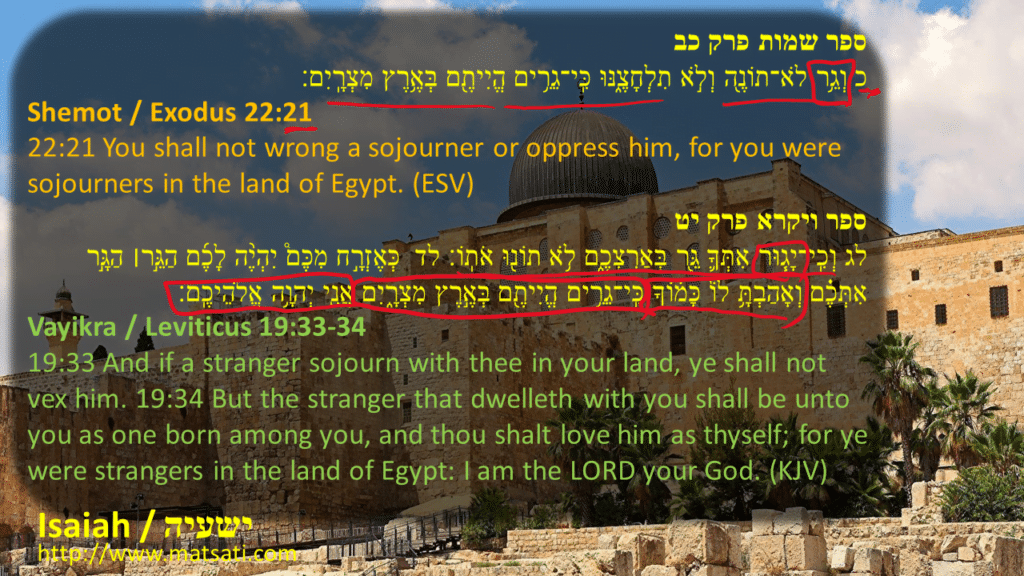
ספר שמות פרק כב
כ וְגֵ֥ר לֹא־תוֹנֶ֖ה וְלֹ֣א תִלְחָצֶ֑נּוּ כִּֽי־גֵרִ֥ים הֱיִיתֶ֖ם בְּאֶ֥רֶץ מִצְרָֽיִם׃
Shemot / Exodus 22:21
22:21 You shall not wrong a sojourner or oppress him, for you were sojourners in the land of Egypt. (ESV)
ספר ויקרא פרק יט
לג וְכִֽי־יָג֧וּר אִתְּךָ֛ גֵּ֖ר בְּאַרְצְכֶ֑ם לֹ֥א תוֹנ֖וּ אֹתֽוֹ׃ לד כְּאֶזְרָ֣ח מִכֶּם֩ יִהְיֶ֨ה לָכֶ֜ם הַגֵּ֣ר׀ הַגָּ֣ר אִתְּכֶ֗ם וְאָהַבְתָּ֥ לוֹ֙ כָּמ֔וֹךָ כִּֽי־גֵרִ֥ים הֱיִיתֶ֖ם בְּאֶ֣רֶץ מִצְרָ֑יִם אֲנִ֖י יְהוָ֥ה אֱלֹהֵיכֶֽם׃
Vayikra / Leviticus 19:33-34
19:33 And if a stranger sojourn with thee in your land, ye shall not vex him. 19:34 But the stranger that dwelleth with you shall be unto you as one born among you, and thou shalt love him as thyself; for ye were strangers in the land of Egypt: I am the LORD your God. (KJV)
We note again the Torah command that is connected to Isaiah’s prophecy of Moab. These commands set Israel as unique among the nations. In the communities that are not of the family of God, generally speaking the foreigner is fair game to exploit. The commands here God tells Israel to treat foreigners as native born. This is a significant departure from the ways of the nations that are coupled to love, mercy, and grace. The Torah command speaks against exploitation (see Shemot / Exodus 23:9 and Vayikra / Leviticus 19:33). The Lord God even wants His people to “love the stranger who dwelt with them as themselves.” (Leviticus 19:34) Providing shelter is part of these commands and something that Isaiah is speaking of on behalf of the people of Moab. We note that when we consider the Torah these verses become very clear and are not so misunderstood based upon a large number of antinomian commentators.
ספר ישעיה פרק טז
ה וְהוּכַן בַּחֶסֶד כִּסֵּא וְיָשַׁב עָלָיו בֶּאֱמֶת בְּאֹהֶל דָּוִד שֹׁפֵט וְדֹרֵשׁ מִשְׁפָּט וּמְהִר צֶדֶק:
Isaiah 16:5 states, “And in mercy shall the throne be established: (וְהוּכַן בַּחֶסֶד כִּסֵּא) and he shall sit upon it in truth in the tabernacle of David, (וְיָשַׁב עָלָיו בֶּאֱמֶת בְּאֹהֶל דָּוִד) judging, and seeking judgment, and hasting righteousness. (שֹׁפֵט וְדֹרֵשׁ מִשְׁפָּט וּמְהִר צֶדֶק)” Isaiah here speaks of the establishment of the Davidic throne at a future time. We note previously Isaiah 6:1 and 9:7.
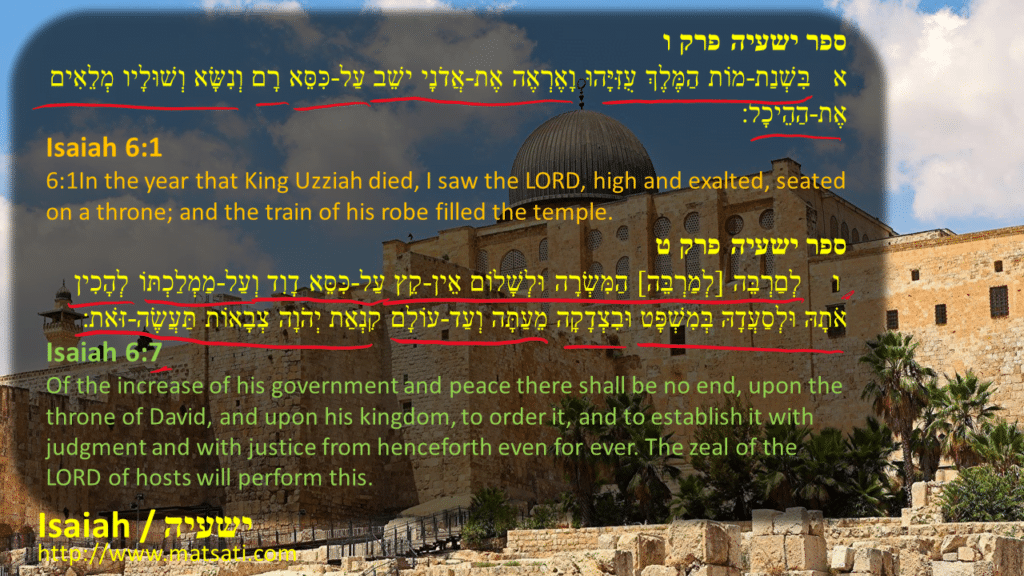
ספר ישעיה פרק ו
א בִּשְׁנַת-מוֹת הַמֶּלֶךְ עֻזִּיָּהוּ וָאֶרְאֶה אֶת-אֲדֹנָי ישֵׁב עַל-כִּסֵּא רָם וְנִשָּׂא וְשׁוּלָיו מְלֵאִים אֶת-הַהֵיכָל:
Isaiah 6:1
6:1In the year that King Uzziah died, I saw the LORD, high and exalted, seated on a throne; and the train of his robe filled the temple.
ספר ישעיה פרק ט
ו לְםַרְבֵּה [לְמַרְבֵּה] הַמִּשְֹרָה וּלְשָׁלוֹם אֵין-קֵץ עַל-כִּסֵּא דָוִד וְעַל-מַמְלַכְתּוֹ לְהָכִין אֹתָהּ וּלְסַעֲדָהּ בְּמִשְׁפָּט וּבִצְדָקָה מֵעַתָּה וְעַד-עוֹלָם קִנְאַת יְהֹוָה צְבָאוֹת תַּעֲשֶֹה-זֹּאת:
Isaiah 6:7
Of the increase of his government and peace there shall be no end, upon the throne of David, and upon his kingdom, to order it, and to establish it with judgment and with justice from henceforth even for ever. The zeal of the LORD of hosts will perform this.
This is the promise of God in the Messiah, the establishment of the throne of David forever, and of the steadfast love (chesed, חסד, Isaiah 16:5) of God that is a foundation stone of his rule. This phrase וְהוּכַן בַּחֶסֶד כִּסֵּא וְיָשַׁב עָלָיו בֶּאֱמֶת בְּאֹהֶל דָּוִד שֹׁפֵט וְדֹרֵשׁ מִשְׁפָּט וּמְהִר צֶדֶק we note the Ugarit and Hebrew bible parallels:
Shemot / Exodus 18:13, Judges 10:1–2, 2 Kings 15:5, Isaiah 16:5, 28:6, Tehillim / Psalms 9:5
ישׁב “to sit” … שׁפט “to judge”
Judges 4:4–5
שׁפט “to judge” … ישׁב “to sit”
Joel 4:12
ישׁב “to sit” + שׁפט “to judge”
Isaiah 16:5
כון (Hp) “to be established” // ישׁב “to sit”
Tehillim / Psalms 107:36
ישׁב (H) “to cause to dwell” // כון (L) “to establish”
Shemot / Exodus 15:17, 1 Kings 8:13, 8:39, 8:43, Tehillim / Psalms 33:14, etc.
מכון “abode” + שׁבת “dwelling”
See the connections between these words in the phrase, וְהוּכַן בַּחֶסֶד כִּסֵּא וְיָשַׁב עָלָיו בֶּאֱמֶת בְּאֹהֶל דָּוִד שֹׁפֵט “And in mercy shall the throne be established: and he shall sit upon it in truth in the tabernacle of David, judging, and seeking judgment, and hasting righteousness.” Note the uses of the word כון (Hp) “to be established” paralleled to ישׁב “to sit” and ישׁב “to sit” is paralleled שׁפט “to judge,” etc. These things are part of a special vocabulary in the Holy Scriptures regarding the Davidic King. When we compare the language along with the insights into these words being connected (paralleled) in the Hebrew Bible, clearly this verse Isaiah 16:5 is messianic where Isaiah recognizes the hope of Moab to seek the God of Israel, to turn from her sinful ways, and to grab hold of the God who is able to deliver them from any situation, no matter how great the invading army! We learn in the Apostolic Writings that the hope of Israel and the nations is found in the living Word of God become flesh (John 1:1-14) who show us the way of truth and life, to learn God’s ways, and to walk in them based upon how He demonstrated for us to walk in His footsteps, Yeshua the Messiah!
ספר ישעיה פרק טז
ו שָׁמַעְנוּ גְאוֹן-מוֹאָב גֵּא מְאֹד גַּאֲוָתוֹ וּגְאוֹנוֹ וְעֶבְרָתוֹ לֹא-כֵן בַּדָּיו:
Isaiah 16:6 states, “We have heard of the pride of Moab; (שָׁמַעְנוּ גְאוֹן-מוֹאָב) he is very proud: (גֵּא מְאֹד) even of his haughtiness, and his pride, and his wrath: but his lies shall not be so. (גַּאֲוָתוֹ וּגְאוֹנוֹ וְעֶבְרָתוֹ לֹא-כֵן בַּדָּיו)” We note that it is the pride of a nation that leads to its fall. This is the theme that Isaiah has been laying down for us throughout his prophecy in Isaiah 1-15. Here Isaiah reflects upon the pride of Moab and their wealth, and the futility of relying upon their wealth and their false gods as opposed to the God of Israel. We note the prophecy from the hand that appeared and wrote on the wall “mene mene tekel upharsin” in the book of Daniel in chapter 5. This is the story about Belshazzar’s feast and the writing on the wall. This story tells how Belshazzar holds a great feast and drinks from the vessels that had been looted in the destruction of the First Temple. A hand appears and writes on the wall. The terrified Belshazzar calls for his wise men, but they are unable to read the writing. The queen advises him to send for Daniel, renowned for his wisdom. Daniel reminds Belshazzar that his father Nebuchadnezzar, when he became arrogant, was thrown down until he learned that God has sovereignty over the kingdom of men. Belshazzar had likewise blasphemed God, and so God sent this hand. Daniel then reads the message and interprets it: God has numbered Belshazzar’s days, he has been weighed and found wanting, and his kingdom will be given to the Medes and the Persians. And the Scriptures say that it was in that very same night that the kingdom fell to the Medes and the Persians. This speaks to Isaiah 15:1 which states that in one night what Moab has will be taken away. Note how that mockery of God does not go unnoticed. This kind of pride will lead to a fall, and all of the wealth and abundance that it is founded upon will be lost. We note how the Torah is also concerned with pride from the sense of the Kohen HaGadol (High Priest) becoming haughty. The Torah commands are given such that the poor, the less fortunate will not become despondent and emotionally broken. The Gemara in the Talmud Bava Kama states that when one brings the bikkurim (first fruits) to Jerusalem, they are to give to the Kohenim (Priests) in gold and silver baskets. The poor however would not be able to do it in this way but gave their fruits in baskets weaned from reeds and such. The narrative goes that the priest gave the baskets back to the rich and accepted the baskets of the poor. The point was that the kohen would keep the basket and cause an additional burden upon the poor. The conclusion was to also give back the basket to the poor, so as to keep their pride intact, to bring honor to their offering through not placing a further burden upon the poor having to acquire another basket. The idea was to show respect to both those who bring the bikkurim which causes one to receive respect and honor. This is something that is very difficult for the proud to bring themselves to showing respect towards others.
ספר ישעיה פרק טז
ז לָכֵן יְיֵלִיל מוֹאָב לְמוֹאָב כֻּלֹּה יְיֵלִיל לַאֲשִׁישֵׁי קִיר-חֲרֶשֶֹת תֶּהְגּוּ אַךְ-נְכָאִים:
Isaiah 16:7 states, “Therefore shall Moab howl for Moab, every one shall howl: (לָכֵן יְיֵלִיל מוֹאָב לְמוֹאָב כֻּלֹּה יְיֵלִיל) for the foundations of Kirhareseth shall ye mourn; surely they are stricken. (לַאֲשִׁישֵׁי קִיר-חֲרֶשֶֹת תֶּהְגּוּ אַךְ-נְכָאִים)” Isaiah states לָכֵן יְיֵלִיל מוֹאָב לְמוֹאָב כֻּלֹּה יְיֵלִיל that all the people of Moab will howl due to the destruction and being caused to be driven from their homes and ancestral lands. The Shulchan Aruch lists all of the orthodox halachic rulings for mourners; below is only a short list.
A mourner is forbidden to wear TEFILLIN (phylacteries) on the first day (see 388:1-2); to work or do business, wash his body or clothes, wear leather shoes, sit on a chair, have sexual relations, study Torah, or greet people, for seven days; and to iron or repair his clothes, cut his hair, or participate in festive activities for 30 days (380:1), and longer (up to 12 months) when mourning for a parent (see 380:24-25;385:1-3;389:3,5; 390:4;391:2-3;393:2;399:4). On the prohibition of work and business and on others doing them for the mourner see 380:2-25; on washing and cosmetics see 381:1-6; on shoes see 382:1-5; on sitting (and on covering the head) see 386:1 and 387:1-2; on sexual relations see 342:1 and 383:1-2; on Torah study see 384:1-2,4-5; on greeting see 343:2 and 385:1-3; on care for clothes see 389:1-8; on cutting the hair see 390:1-7; on festive activities see 391:1-3 and 393:2; on marriage (and remarriage) see 342:1 and 392:1-3. A mourner should not go out of his home or occupy his regular place (e.g., in the synagogue); see 393:1-4. On a mourner participating in religious ceremonies or being part of a religious quorum see 379:5;384:2-3,391:3;400:1.
www.Torah.org
The idea here is for honoring the memory of the dead. This particular aspect of mourning is not what Moab is mourning over, as Moab is being invaded and the people are being driven from their homes due to their sins. They howl because their fields are empty, and their markets are deserted, and their houses are burned. This great loss is expressed in the phrase, לָכֵן יְיֵלִיל מוֹאָב לְמוֹאָב כֻּלֹּה יְיֵלִיל that every Moabite will feel the hardship of war, destruction, and death. These are attributes of the life of an unrepentant sinner, those things of which God delays bringing for the purpose of repentance. Note how great the God of Israel is, His delay of payment for our sins is meant for the purpose of mercy, and grace, and gives us opportunity to turn from our sinful ways and believe upon the Messiah Yeshua! It is easy to see the parallels in today’s society around the world, such as the Ukraine, how quickly destruction can come once that time for repentance has run out. These things remind us of the uncertainty of life, and of the surety of our savior Yeshua, and God our Father in heaven who loves us! All the more reason to heed the call to repentance that Isaiah is calling to the people, and even that Yeshua is calling us to (Mark 1:15-16) and seek our Father in heaven through faith in His Son, Yeshua the Messiah!
Rabbinic Commentary
The Targum Jonathan is an Aramaic and Rabbinic interpretation of the book of Isaiah and therefore a valuable resource for our study of the book of Isaiah and his prophecies.
תרגום יונתן בן עוזיאל אל ישעיה פרק טז:א-ז
א יְהֹון מַסְקֵי מִסִין לִמשִיחָא דְיִשׂרָאֵל דְתַקֵיף עַל דַהְוָה כְמַדבְרָא טוּר כְנִשתָא דְצִיֹון׃ ב וִיהֵי כְעֹופָא דְאַפרְחוּהִי מִקִינֵיה וְאִיטַלטַל יִתַפקָן יִהוְיָן בְנָת מֹואָב מְגִוזִין לְהֹון לְאַרנֹון׃ ג אִתמְלִיכִי מֵילַך עְבִידִי עֵיצָא שַוַא כְלֵיליָא טוּלִיך כִימָמָא בְגֹו טֵיהְרָא טַמַרִי מְטֻלטְלַיָא וּמבֻדְרַיָא לָא תְקָרְבִין׃ ד יִתיַתְבוּן בִיך מְטֻלטְלַיָא מַלכוּת מֹואָב הְוִי סִתרָא לְהֹון מִן קֳדָם בָזֹוזִין אְרֵי סָף מָעִיקָא אִשתֵיצִי בָזְזָא סָפוּ כָל דָהְוֹו דָיְשִין אַרעָא׃ ה בְכֵין מְשִיחָא דְיִשׂרָאֵל יִתַקַן בְטוּב כוּרסֹוהִי וִיתֵיב עְלֹוהִי בִקשֹוט בְקַרתָא דְדָוִיד דַייָן וְתָבַע דִין וְעָבֵיד קְשֹוט׃ ו שְמַענָא רַברְבֵי מֹואָב דְמִתגָאַן לַחדָא יַקִירֵיהֹון וּמפַנְקֵיהֹון וּגֵיוְתָנוּתְהֹון לָקֳבֵיל פֹורעָנוּתְהֹון לָא שָוֵי לְהֹון׃ ז בְכֵין מֵילְלִין מֹואְבָאֵי וּמֹואְבָאֵי כוּלְהֹון מַצוְחִין עַל אְנָש כְרָך תוּקפְהֹון יֵימְרוּן בְרַם כְבִישִין׃
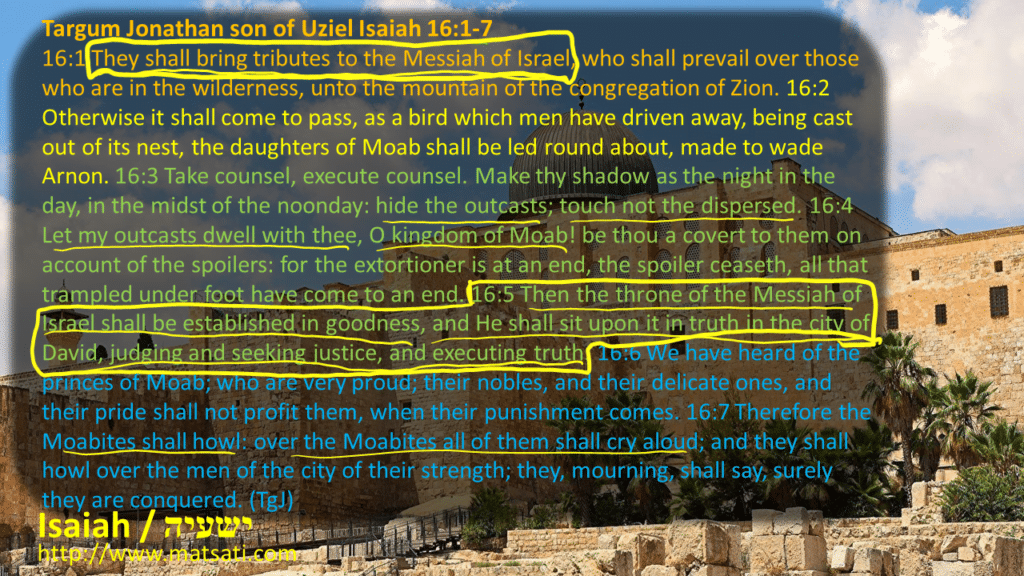
Targum Jonathan son of Uziel Isaiah 16:1-7
16:1 They shall bring tributes to the Messiah of Israel, who shall prevail over those who are in the wilderness, unto the mountain of the congregation of Zion. 16:2 Otherwise it shall come to pass, as a bird which men have driven away, being cast out of its nest, the daughters of Moab shall be led round about, made to wade Arnon. 16:3 Take counsel, execute counsel. Make thy shadow as the night in the day, in the midst of the noonday: hide the outcasts; touch not the dispersed. 16:4 Let my outcasts dwell with thee, O kingdom of Moab! be thou a covert to them on account of the spoilers: for the extortioner is at an end, the spoiler ceaseth, all that trampled under foot have come to an end. 16:5 Then the throne of the Messiah of Israel shall be established in goodness, and He shall sit upon it in truth in the city of David, judging and seeking justice, and executing truth. 16:6 We have heard of the princes of Moab; who are very proud; their nobles, and their delicate ones, and their pride shall not profit them, when their punishment comes. 16:7 Therefore the Moabites shall howl: over the Moabites all of them shall cry aloud; and they shall howl over the men of the city of their strength; they, mourning, shall say, surely they are conquered. (TgJ)
According to the TgJ, the interpretation of the word כַר in Isaiah 16:1 is to the Messiah (לִמשִיחָא) saying, א יְהֹון מַסְקֵי מִסִין לִמשִיחָא דְיִשׂרָאֵל דְתַקֵיף עַל דַהְוָה כְמַדבְרָא טוּר כְנִשתָא דְצִיֹון׃ 16:1 They shall bring tributes to the Messiah of Israel, who shall prevail over those who are in the wilderness, unto the mountain of the congregation of Zion. (TgJ) The כַר “lamb” is representative of the Messiah who goes forth to deliver those who are in need and seek the God of Israel. Note based upon the hermeneutical principle of Gezerah Shavah there is a parallel to Yeshua the Messiah in the NT text being described as the lamb of God. Ibn Ezra interprets כַר as a dromedary. The dromedary (Camelus dromedarius), also known as Arabian camel, is a large even-toed ungulate, of the genus Camelus, with one hump on its back.
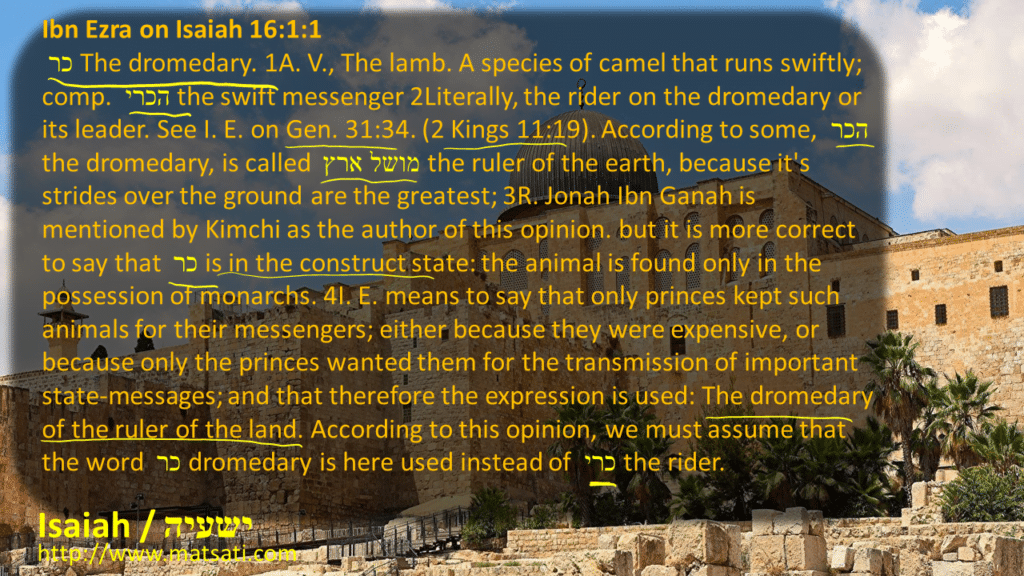
Ibn Ezra on Isaiah 16:1:1
כר The dromedary. 1A. V., The lamb. A species of camel that runs swiftly; comp. הכרי the swift messenger 2Literally, the rider on the dromedary or its leader. See I. E. on Gen. 31:34. (2 Kings 11:19). According to some, הכר the dromedary, is called מושל ארץ the ruler of the earth, because it’s strides over the ground are the greatest; 3R. Jonah Ibn Ganah is mentioned by Kimchi as the author of this opinion. but it is more correct to say that כר is in the construct state: the animal is found only in the possession of monarchs. 4I. E. means to say that only princes kept such animals for their messengers; either because they were expensive, or because only the princes wanted them for the transmission of important state-messages; and that therefore the expression is used: The dromedary of the ruler of the land. According to this opinion, we must assume that the word כר dromedary is here used instead of כרי the rider.
The idea that Ibn Ezra is putting forward is that this כַר is an animal that one rides upon, and in this case a leader but the main conclusion is that this is a reference to the beast itself as opposed to the one who is riding the beast. This may lead some credence to the interpretation of the כַר as being “lamb.” We note the occurrences of this word as “lamb” versus “ram.” HALOT lexicon defines this word as “ram; battering ram,” the BDB lexicon defines this word as “he-lamb, battering ram” and the DBL Hebrew lexicon defines it as “ram-lamb, battering ram.” This word occurs only once in the DSS sectarian documents 4Q171 f1+3–4iii:5a ו אוהבי יהוה כיקר כורים. פשר[ו — ] but occurs 12 times in the Hebrew Bible (Tanakh).
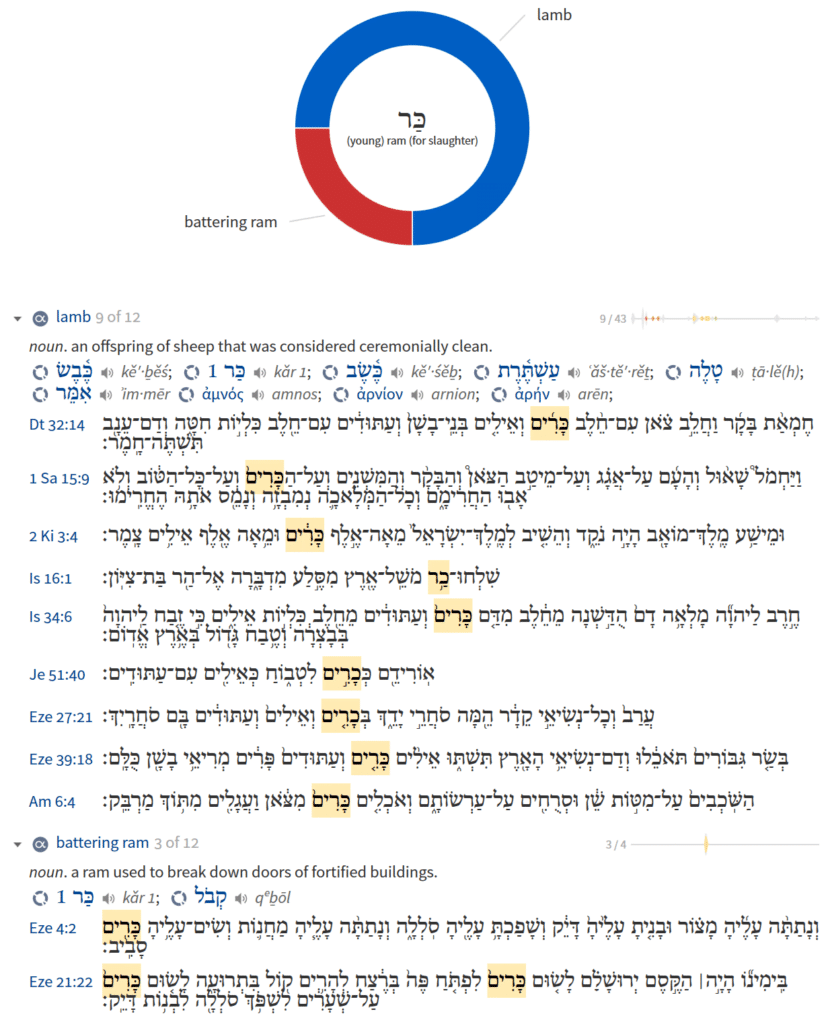
We note that three references in Ezekiel (Ezekiel 4:2, 21:22) use the word כרים to refer to a battering-ram to break down the doors of a fortified building. In the other occurrences of כרים (Devarim / Deuteronomy 32:14, 1 Samuel 15:9, 2 Kings 3:4, Isaiah 16:1, Isaiah 34:6, Jeremiah 51:40, Ezekiel 27:21, 39:18, and Amos 6:4) the word is translated as lamb. This evidence provides us with enough information to conclude the translation according to the KJV where כַר means “lamb” and the connection to the TgJ interpretation of the Messiah. This is a nice analogy to the Messiah of God sent to save those who are lost and bring peace to a nation. This is a consistent theme of the NT narrative on the life and work of Yeshua the Messiah. Note how the Talmud supports this interpretation according to the Talmud Bavli Niddah 31b.
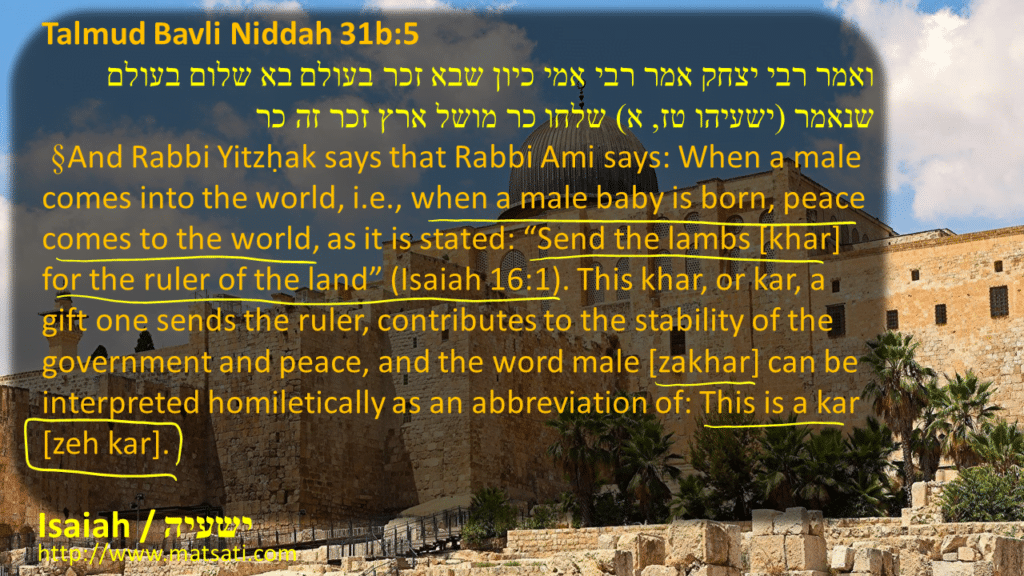
Talmud Bavli Niddah 31b:5
ואמר רבי יצחק אמר רבי אמי כיון שבא זכר בעולם בא שלום בעולם שנאמר (ישעיהו טז, א) שלחו כר מושל ארץ זכר זה כר
§ And Rabbi Yitzḥak says that Rabbi Ami says: When a male comes into the world, i.e., when a male baby is born, peace comes to the world, as it is stated: “Send the lambs [khar] for the ruler of the land” (Isaiah 16:1). This khar, or kar, a gift one sends the ruler, contributes to the stability of the government and peace, and the word male [zakhar] can be interpreted homiletically as an abbreviation of: This is a kar [zeh kar].
Here the Rabbis consider the significance of a male child that is born יֶלֶד יֻלַּד sounds like a parallel to the Isaiah 9:5 text. Their interpretation is that peace will be brought to the world. The כר lamb is interpreted as a gift that contributes to the stability of the neighboring government. Note how this interpretation may be built from Hillel’s 6th principle of hermeneutics כיוצא בו במקום אחר “Keyotza bo bamakom acher” where the Messiah is the bringer of peace. Could this be how the TgJ understands this connection to the lamb and the Messiah according to Isaiah 16:1? The rabbis of the Talmud go on saying the following according to the Talmud Bavli Sanhedrin 96b.
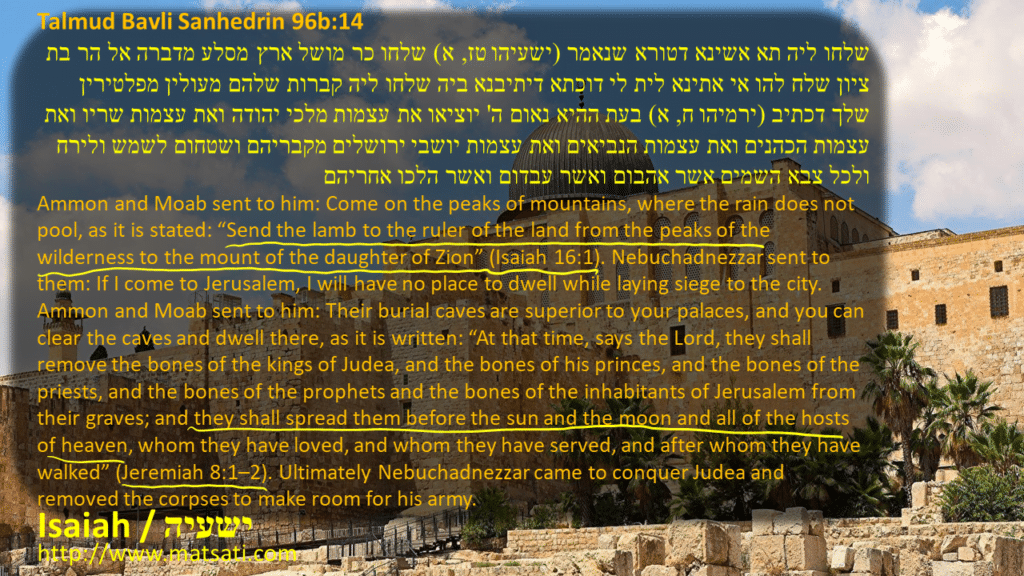
Talmud Bavli Sanhedrin 96b:14
שלחו ליה תא אשינא דטורא שנאמר (ישעיהו טז, א) שלחו כר מושל ארץ מסלע מדברה אל הר בת ציון שלח להו אי אתינא לית לי דוכתא דיתיבנא ביה שלחו ליה קברות שלהם מעולין מפלטירין שלך דכתיב (ירמיהו ח, א) בעת ההיא נאום ה’ יוציאו את עצמות מלכי יהודה ואת עצמות שריו ואת עצמות הכהנים ואת עצמות הנביאים ואת עצמות יושבי ירושלים מקבריהם ושטחום לשמש ולירח ולכל צבא השמים אשר אהבום ואשר עבדום ואשר הלכו אחריהם
Ammon and Moab sent to him: Come on the peaks of mountains, where the rain does not pool, as it is stated: “Send the lamb to the ruler of the land from the peaks of the wilderness to the mount of the daughter of Zion” (Isaiah 16:1). Nebuchadnezzar sent to them: If I come to Jerusalem, I will have no place to dwell while laying siege to the city. Ammon and Moab sent to him: Their burial caves are superior to your palaces, and you can clear the caves and dwell there, as it is written: “At that time, says the Lord, they shall remove the bones of the kings of Judea, and the bones of his princes, and the bones of the priests, and the bones of the prophets and the bones of the inhabitants of Jerusalem from their graves; and they shall spread them before the sun and the moon and all of the hosts of heaven, whom they have loved, and whom they have served, and after whom they have walked” (Jeremiah 8:1–2). Ultimately Nebuchadnezzar came to conquer Judea and removed the corpses to make room for his army.
This idea of taking the bones out of the grave and spreading them across the land, this has the effect of making every place that one walks unclean. Notice how this is connected to Nebuchadnezzar saying that he would have no place to dwell while laying siege to the city. This is either connected to the spreading of the bones everywhere, making no clean place to dwell, or to the king of Babylon needing to defile the land such that he would consider this a place to dwell. These things speak to the unclean practices of the nations in their sin and rebellion to God in heaven. Note that the prophets of the nations also use bones to predict the future. During China’s Shang Dynasty prophets used animal bones to predict the future. Dating back to at least 1600 B.C., the bones were used by trusted diviners to relay ancestral prophecies to members of the royal family. Hundreds of years later, historians are translating ancient tablets that were discovered in an attempt to try to reconstruct their methods of prediction. In Harry Potter: A History of Magic, author JK Rowling wrote about the ancient artifacts that inspired the enchanting world of Harry Potter, including the ancient Chinese oracle bones found at the British Library. We note in catholicism, the use of the bones of dead saints of God are used quite often. In fact, their claim is that the bones of the dead sanctify a person through contact, which is diametrically opposite or in contradiction to what we read according to the Torah! These things are called “Relics” and are divided into two classes: First class or real relics include the physical body parts, clothing and instruments connected with a martyr’s imprisonment, torture, and execution. Second class or representative relics are those which the faithful have touched to the physical body parts or grave of the saint. The proof texts that are used include 2 Kings 2:9-14, 13:20-21, Acts 19:11-12, etc. These examples from Scripture speak to Elisha taking up the mantle of Elijah, though in this case Elijah had not died. In the next passage, some people hurriedly bury a dead man in the grave of Elisha, “but when the man came into contact with the bones of Elisha, he came back to life and rose to his feet.” In Acts of the Apostles we read, “Meanwhile, God worked extraordinary miracles at the hands of Paul. When handkerchiefs or cloths which had touched, his skin were applied to the sick, their diseases were cured, and evil spirits departed from them.” Each of these examples are used as a proof text to walk in the way of the nations from the sense of believing one can draw near to God through the use of bones and pieces of clothing or even the instruments of death that were used against the faithful people of God. These things cause one to have faith in the practice, the object, as opposed to the Lord God Almighty, our Father in heaven. This practice began when the catholic church legalized this practice in 313 AD. After the legalization the tombs of saints were opened, and the actual relics were worshiped by the faithful. A bone or other bodily part was placed in a reliquary (a box), locket and later a glass case to preserve it and such. These things speak to the purpose of the Torah command to not do such things, to not walk in the ways of the nations in their abominable practices.
Isaiah goes on according to the TgJ saying, ב וִיהֵי כְעֹופָא דְאַפרְחוּהִי מִקִינֵיה וְאִיטַלטַל יִתַפקָן יִהוְיָן בְנָת מֹואָב מְגִוזִין לְהֹון לְאַרנֹון׃ 16:2 Otherwise it shall come to pass, as a bird which men have driven away, being cast out of its nest, the daughters of Moab shall be led round about, made to wade Arnon. (TgJ) The TgJ speaks of the bird that is driven from its nest as we had mentioned previously the connection to the Torah command concerning the mother bird and its young. Midrash Tanchuma, Ki Teitzei 2:1 has the following to say concerning this verse.
Midrash Tanchuma, Ki Teitzei 2:1
(Deut. 22:6-7), “You come across a bird nest, [….] You must surely let the mother go.” This text is related (to Prov. 4:23), “More than any observance preserve your heart, for out of it comes life.” R. Abba said, “There are two hundred and forty-eight positive commandments in the Torah corresponding to the organs that are in a human being; for each and every day they cry out at the person, ‘Perform a commandment with me so that we may live through its merit and you may lengthen your life.’ There are also three hundred and sixty-five negative commandments like the number of the solar days. So on each and every day while the sun rises until it sets, it speaks and cries out at a person, ‘Decree me upon yourself by the One who has brought your days up to this day. Do not commit this transgression against me, and do not tilt yourself and the whole world toward the scale of guilt.’” Here are six hundred and thirteen commandments. Moreover, for each and every commandment there is a recorded reward. For example honoring father and mother (in Exod. 20:12 // Deut. 5:16) and leaving a nest alone (in Deut. 22:7) about which it is written, a lengthening of life. There are also commandments with children as the reward; as, for example, Sarah, who hosted guests (in Gen. 18:6-14), and the Shunammite woman, who received Elisha (II Kings. 4:8-17). There is [also] a transgression, [which may] require stoning, burning, slaying (with the sword),8Hereg. See Sanh. 7:3, for the interpretation of hereg as beheading with a sword. or strangulation.9For details on all four types of execution, see ibid., 6:4; 7:1–3. Of all the commandments, none is as easy as leaving a nest alone. And what it its remuneration (according to Deut. 22:7)? “In order that it may be well with you and you may lengthen your life.” A parable: To what is the matter comparable? To a king who brought laborers into his field to plant it but did not reveal to them the remuneration for their planting. At evening he gave one gold coin to whoever planted a tree. They all began to be amazed and say, “Now if the one who has only planted a light and small tree [has received] one gold coin, how much the more will there be for us who have planted many [of them].”10Cf. Deut. R. 6:2. So if the remuneration for leaving a nest alone has a lengthening of life as its remuneration, how much more will be the remuneration for a commandment in which there is material loss, hardship, and [the need to] preserve one’s life? For this reason the Holy One, blessed be He, did not explain the remuneration for the commandments which are in the Torah, so that Israel of its own accord would fulfill them and thereby increase the remuneration. Thus we have learned (in Avot 1:3), “Do not be like servants who serve the master for the sake of receiving a reward […].” It is therefore written (in Prov. 4:23), “More than any observance preserve your heart, [for out of it comes life].” There is a story about someone who went up to the top of a tree to fulfill the commandment of leaving a nest alone, and he fell and died. [This is] because it is stated (Deut. 22:7), “When you come across a bird nest on the way,” and not that you see it at the top of the trees and go up after it. The verse (Ps. 94:12) states, “Happy is the man whom You discipline, O Lord, the man You instruct in Your Torah.” Rabbi Elazar ben Yaakov said, “A man must remember gratitude to the Holy One, blessed be He, at a time when afflictions come upon him. Why? Because afflictions draw a man to the Holy One, blessed be He, as it is stated (Prov. 3:12), ‘For whom the Lord loves, He rebukes, as a father the son whom he favors.’” R. Shimon bar Yochai said, “If a man’s son dies, he should not voice a complaint, as the son causes him to be acceptable to the Holy One, blessed be He.” There is a parable: To what is the matter comparable? To a king who became angry with the son of his daughter, and someone else came and made this son of his acceptable in front of the king. That son of the daughter says, “Do [I] not need to remember gratitude to the one that made [me] acceptable?” So [too] if a man’s son dies, he should remember gratitude to the Holy One, blessed be He, as the son made the father acceptable to his Creator. Why? (As in Prov. 3:12), “For whom the Lord loves, He rebukes, [as a father the son whom he favors].” Therefore David said in (Ps. 94:12), “Happy is the man whom You discipline, O Lord.” If afflictions come to a person, he should stand firm and accept them. Why? As there is no end to its remuneration. And from where (in Scripture) do you learn [this]? From the tooth and the eye [that is injured], through which a gentile slave goes out to freedom. Is it not [then] fitting that afflictions that scour the entire body of man atone? R. Chiya bar Abba said, “Since it is stated about the one that fulfills the commandment of leaving the nest alone, ‘in order that it may be well with you,’ all the more so will the death of a man’s child atone for him.” (Deut. 22:7:) “And the young (literally, children) take for yourself.” If you do not have children, I will give you children as the reward for this commandment. Another interpretation of (Deut. 22:7), “You must surely let [the mother] go.” If you let them go, (as in Is. 59:18) “According to their deeds, so shall He repay.” [See] what is written (in Jer. 50:33-34), “The children of Israel are oppressed […] they refuse to let them go. Their redeemer is mighty, [His name is] the Lord of hosts; He shall surely fight their fight.” [It also says (in Is. 16:2),] “For it shall be that the daughters of Moab at the fords of the Arnon shall be like a migrating bird, an abandoned nest.” This text is related (to Jer. 17:11), “As a partridge hatches without laying, so is one who makes money apart from justice….” What is written after that (in vs. 12)? “A glorious throne exalted from the beginning, our sacred shrine.” What is the connection between the two [verses]? Whoever says a partridge hatches is [really] saying a glorious throne. [This is] to teach you that a partridge brings eggs from other birds and sits on them until [the young] emerge from their shells and become fledglings. Then they rise up over it and pluck its wings. When it goes out to fly, it is unable [to do so] because its wings are plucked. So a wild beast or reptile finds it and eats it. And what caused its [destruction]? [It happened] because it had raised eggs that were not its own. So it shall be with the peoples of the world and the Moabites and the Ammonites that stretched their hands against (according to Jer. 17:12) His glorious throne, destroyed His sacred shrine, burned His Temple, and carried Israel into exile. The Holy One, blessed be He, shall destroy their memory, as the matter is stated (in Zeph. 2:9), “Therefore, as I live, says the Lord of hosts, the God of Israel, surely Moab shall become like Sodom, [and the children of Ammon like Gomorrah].”
Midrash Tanchuma Ki Teitzei 2:1 speaks to the biblical text from Mishley / Proverbs 4:23 connecting the driving away of the mother to the heart. How great is the cruelty of the heart to take a mother from its nest along with its young? The rabbis speak to the commands from Shemot / Exodus 20:12 and Devarim / Deuteronomy 5:16 (honoring mother and father and the mother bird) will lengthen one’s life. This is connected back to the cruelty of one’s heart since from the heart comes transgressions. We also note that the heart is metaphorical for our minds, so what we think is what leads to action, and so the analogy of the heart being the source of all sorts of evils. The rabbinic commentary speaks of the importance of not obeying God’s command for the purpose of receiving a reward, but that it is our duty as the children of God. This again leads to the idea that one does not earn his salvation through the keeping of the commands. The Midrash also speaks to the importance of recognizing what underlying reasons may lay what happens to us in our lives. The idea is the Lord may be reproving us as the Psalmist states in Tehillim / Psalms 94:12 Happy is the man whom You discipline, O Lord, the man You instruct in Your Torah.” The idea behind letting the mother go, is connected to this time of war and those who flee from war are paralleled to that of the mother bird being driven from the nest. The Torah command is to take care not to harm the bird that is driven from the nest, and in parallel fashion the people of Moab that are being spoken of according to Isaiah 16. The midrash ends saying, “[This is] to teach you that a partridge brings eggs from other birds and sits on them until [the young] emerge from their shells and become fledglings. Then they rise up over it and pluck its wings. When it goes out to fly, it is unable [to do so] because its wings are plucked. So a wild beast or reptile finds it and eats it. And what caused its [destruction]? [It happened] because it had raised eggs that were not its own. So it shall be with the peoples of the world and the Moabites and the Ammonites that stretched their hands against (according to Jer. 17:12) His glorious throne, destroyed His sacred shrine, burned His Temple, and carried Israel into exile. The Holy One, blessed be He, shall destroy their memory, as the matter is stated (in Zeph. 2:9), ‘Therefore, as I live, says the Lord of hosts, the God of Israel, surely Moab shall become like Sodom, [and the children of Ammon like Gomorrah].'” The idea here is of the people raising their children in a sinful way, not teaching them the way of God in heaven according to the Torah, and thus raising children which were not their own. This speaks to the nations that come against the place which God has established His name, and destroying memory of God’s holy Word. Because of these things, the people of Moab and even Moab herself will become like Sodom. We note how this is a significant charge against those who refuse to live their lives according to God’s Word.
Isaiah goes on saying, ג אִתמְלִיכִי מֵילַך עְבִידִי עֵיצָא שַוַא כְלֵיליָא טוּלִיך כִימָמָא בְגֹו טֵיהְרָא טַמַרִי מְטֻלטְלַיָא וּמבֻדְרַיָא לָא תְקָרְבִין׃ 16:3 Take counsel, execute counsel. Make thy shadow as the night in the day, in the midst of the noonday: hide the outcasts; touch not the dispersed. ד יִתיַתְבוּן בִיך מְטֻלטְלַיָא מַלכוּת מֹואָב הְוִי סִתרָא לְהֹון מִן קֳדָם בָזֹוזִין אְרֵי סָף מָעִיקָא אִשתֵיצִי בָזְזָא סָפוּ כָל דָהְוֹו דָיְשִין אַרעָא׃ 16:4 Let my outcasts dwell with thee, O kingdom of Moab! be thou a covert to them on account of the spoilers: for the extortioner is at an end, the spoiler ceaseth, all that trampled under foot have come to an end. ה בְכֵין מְשִיחָא דְיִשׂרָאֵל יִתַקַן בְטוּב כוּרסֹוהִי וִיתֵיב עְלֹוהִי בִקשֹוט בְקַרתָא דְדָוִיד דַייָן וְתָבַע דִין וְעָבֵיד קְשֹוט׃ 16:5 Then the throne of the Messiah of Israel shall be established in goodness, and He shall sit upon it in truth in the city of David, judging and seeking justice, and executing truth. (TgJ) The TgJ goes on and explicitly states that the people are not to touch those who are dispersed, the outcasts from their land. This is consistent with our analysis from the rabbinic literature concerning these things. From the rabbinic category of Musar, Mesilat Yesharim 11:95 states the following:
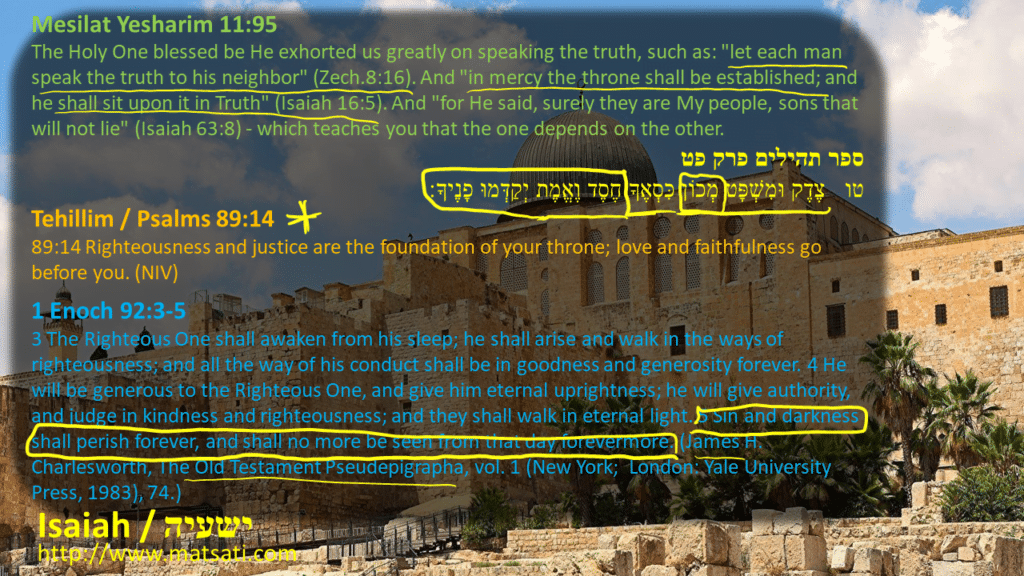
Mesilat Yesharim 11:95
The Holy One blessed be He exhorted us greatly on speaking the truth, such as: “let each man speak the truth to his neighbor” (Zech.8:16). And “in mercy the throne shall be established; and he shall sit upon it in Truth” (Isaiah 16:5). And “for He said, surely they are My people, sons that will not lie” (Isaiah 63:8) – which teaches you that the one depends on the other.
The idea here is that the Lord God has the attribute of truth, upon which His throne is established, according to Isaiah 16:5. Because of these things, the Lord God tells us who are His people to speak truth to one another. The conclusion is that this teaches that we depend upon God’s throne, and vice versa, those who speak truth will be able to stand before His throne to make supplication (prayer). This is consistent with Tehillim / Psalms 89:14.
ספר תהילים פרק פט
טו צֶדֶק וּמִשְׁפָּט מְכוֹן כִּסְאֶךָ חֶסֶד וֶאֱמֶת יְקַדְּמוּ פָנֶיךָ:
Tehillim / Psalms 89:14
89:14 Righteousness and justice are the foundation of your throne; love and faithfulness go before you. (NIV)
The Psalmist states that all of God’s will is consistent with righteousness and justice. These things are the מְכוֹן “dwelling place” of God’s throne, the basis or foundation upon which it stands. The Psalmists states חֶסֶד וֶאֱמֶת יְקַדְּמוּ פָנֶיךָ “grace and truth goes before you” meaning that these things always stand forever before the Lord God our Father in heaven. These are inseparable from the Lord God, and so He commands His people to due righteousness, justice, and truth towards one another. First Enoch 92:3-5 states the following concerning these things.
1 Enoch 92:3-5
3 The Righteous One shall awaken from his sleep; he shall arise and walk in the ways of righteousness; and all the way of his conduct shall be in goodness and generosity forever. 4 He will be generous to the Righteous One, and give him eternal uprightness; he will give authority, and judge in kindness and righteousness; and they shall walk in eternal light. 5 Sin and darkness shall perish forever, and shall no more be seen from that day forevermore. (James H. Charlesworth, The Old Testament Pseudepigrapha, vol. 1 (New York; London: Yale University Press, 1983), 74.)
The book 1 Enoch 92:3-5 speaks to the Olam Haba (World to come) that the dead will rise and the righteous will conduct their ways in goodness and generosity forever. Note again here we read that Sin and darkness will perish forever and will be seen no more forever and ever! We recognize how these themes are consistent throughout the Torah and all of the Scriptures as expounded upon from Jewish thought according to the text, Man and God, Chapter 7 Tzedeq and Tzedakah 3
Man and God, Chapter 7 Tzedeq and Tzedakah 3
In numerous places tzedakah occurs as the opposite to resha or rish’ah, evil, wickedness. The children of Israel, for instance, were warned not to imagine that God brought them into the promised land because they deserved it on account of their tzedakah. Rather, it was because of their wickedness that the original inhabitants were driven out from before Israel.1Deut. 9:4–5. “Wickedness,” of course, is used here in its widest sense. It has no legal connotation of any kind. It is ethical and moral corruption. It includes any act of conduct which is objectionable on moral or religious grounds. This is borne out by the numerous other references in the Bible to the guilt of the original inhabitants of Canaan. This makes it somewhat difficult to define tzedakah, which is here opposed to “wickedness.” Would tzedakah have to be the complete opposite to everything that is here comprehended by “wickedness” or should we be justified in calling tzedakah any act or attitude that is contrary to any part of the evil, which is comprehended by the wider term, wickedness? As might be expected, Proverbs is quite rich in passages in which “evil” and “wickedness” are contrasted to tzedakah, but there, too, the terms are used in too general a sense to allow us to draw more exact conclusions from them. There is, for instance, the saying: “The establishing of tzedakah tendeth to life; but he that pursueth evil pursueth it to his own death.”2Prov. 11:19; cf. also ibid. 11:4–6; 13:6; 15:9. “The pursuit of evil” seems to include any kind of evil, in which case “the establishing of tzedakah” may mean any act of goodness which is the opposite to any kind of evil. Reading again in Proverbs that “the doing of evil is an abomination to kings, for the throne is established by tzedakah,”3Ibid. 16:12. it is easy to misunderstand “the doing of evil” as acting against the law safeguarded by the king, and to interpret tzedakah, accordingly, as righteousness in the sense of justice or the monarchic order. We know however, from other passages that the establishing of a throne is not only a question of law and justice, but also of hesed and emeth, of lovingkindness and faithfulness.4Cf. Isa. 16:5; Prov. 20:28; 29:14. (This, of course, is so because in the Bible, as we have shown, loving kindness and faithfulness belong in the same category of values as “law” and “justice.”) Neither the evil, which is a king’s concern, nor tzedakah, which establishes his throne, should be taken to have a juridical significance. As everywhere else in the Bible, here, too, their implication is ethico-moral and religious.
The Jewish commentary speaks on the topic of Tzedakah (Righteousness) and how there are numerous places in which these are given as opposing terms in the Tanakh. Under the idea of righteousness, the Land of Israel was not given to the people due to their righteousness, but due to the wickedness of the original inhabitants. Their wickedness drove them out of their own land. Their sins were both morally and ethically corrupt. Solomon wrote a lot contrasting the wicked with the righteous, and that the establishment of any kind of king or kingdom must be done in tzedakah righteousness in order to not just safeguard the people, but so that the people also walk in these ways of justice and truth. Remember in Isaiah 1-7 we read how when the leadership is corrupt, so are the people. The entire land becomes corrupted due to the unrighteousness and wickedness of the people. With grace and faithfulness come some form of category of “law” and “justice.” The rabbis say due to the occurrence of these things in the Scriptures, the laws and justice that are established, “their implication is ethico-moral and religious.” Note how the TgJ goes on saying according to Isaiah 16:6-7, ו שְמַענָא רַברְבֵי מֹואָב דְמִתגָאַן לַחדָא יַקִירֵיהֹון וּמפַנְקֵיהֹון וּגֵיוְתָנוּתְהֹון לָקֳבֵיל פֹורעָנוּתְהֹון לָא שָוֵי לְהֹון׃ 16:6 We have heard of the princes of Moab; who are very proud; their nobles, and their delicate ones, and their pride shall not profit them, when their punishment comes. ז בְכֵין מֵילְלִין מֹואְבָאֵי וּמֹואְבָאֵי כוּלְהֹון מַצוְחִין עַל אְנָש כְרָך תוּקפְהֹון יֵימְרוּן בְרַם כְבִישִין׃ 16:7 Therefore the Moabites shall howl: over the Moabites all of them shall cry aloud; and they shall howl over the men of the city of their strength; they, mourning, shall say, surely, they are conquered. (TgJ) Here the TgJ speaks to the pride of the kings and princes, how their pride will not profit them when their punishment from God comes. We note that the teaching of truth must be done from a humble heart. This approach fosters a deep reverence and love, with a childlike humility before God that is not based upon pride and illusions of grandeur. In order for this to be possible in our lives we must ask our Father in heaven by the power of His Holy Spirit, His presence in our lives, for true and real humility such that we can walk in peace and love towards others. This means overlooking even some of our own doctrinal convictions for the sake of love towards one another. So essentially, we overlook what it means to be misunderstood, even to suffer or be mistreated by others. Even though it is important to guard our sincere convictions and to be passionate about what we believe, we must nevertheless be careful to walk in humility before God and others. These things would not be possible if it were not for our Messiah Yeshua who led the way as we are called to walk in His footsteps, to believe in Him and what He had done, and consequently believing in our Father in heaven who loves us dearly.
